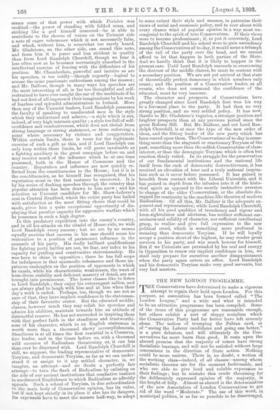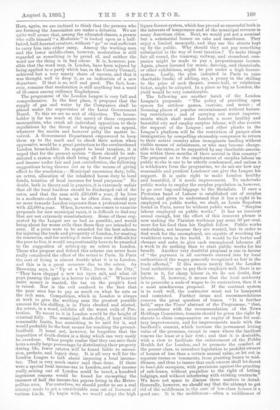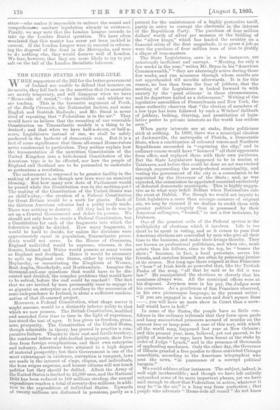THE NEW LONDON PROGRAMME. T HE Conservatives have determined to make
a vigorous attempt to regain their hold upon London. For this purpose, an association has been formed called " The London League," and a wide and what is intended to be an attractive programme has been compiled. Some of the items of this programme are reasonable enough, but others exhibit a sort of sloppy socialism which the Conservative Party had far better have left severely alone. The notion of trumping the Fabian card, or of " seeing the Labour candidates and going one better," is a pure delusion, and will ultimately do the Con- servatives far more harm than good. It rests upon the absurd premiss that the majority of voters have strong Socialistic leanings, and will not be satisfied without large concessions in the direction of State action. Nothing could be more untrue. There is, no doubt, a section of the working class—indeed, of all classes—among whom socialistic theories are for the moment fashionable, and who are able to give loud and voluble expression to their feelings ; but to mistake this crude theorising for the deliberately expressed opinion of the majority, is the height of folly. Almost as absurd is the determination of the new Association of London Conservatives to get rid of the word "Moderate." The use of this word, in municipal politics, is as far as possible to be discouraged. Here, again, we are inclined to think that the persons who are forming the Association are under a delusion, We are quite well aware that, among the educated classes, a person who calls himself " a Moderate " is looked upon as a half- baked, half-hearted creature, without " go" or zeal sufficient to carry him into either camp. Among the working men, and the lower middle-class, however, moderation is still regarded as something to be proud of, and neither the word nor the thing is in bad odour. It is, however, pos- sible that the word may, in London, have been injured by being applied to a party which has, in the County Council, achieved but a very scanty share of success, and that it was thought well to drop it, as an indication of a new departure. If that is so, well and good. The fact, how- ever, remains that moderation is still anything but a word of ill-omen among ordinary Englishmen. The programme of the London League is very full and comprehensive. In the first place, it proposes that the supply of gas and water by the Companies shall be placed under the supervision of the Local Government Board. To this we see no sort of objection. The house- holder is far too much at the mercy of these corporate monopolists, who crush all individual opposition to their regulations by the threat of heaping appeal on appeal, whatever the merits and however petty the matter in- volved. A Government Department empowered to keep them up to the mark and to check their action when oppressive, would be a great protection to the overburdened London householder. In regard to local taxation, it is urged that for the present system " there should be sub- stituted a system which shall bring all forms of property and income under fair and just contribution, the following suggestions being thrown out as to the means of giving effect to the resolution :—Municipal succession duty, tolls, an octroi, allocation of the inhabited house duty to local funds, taxation of local incomes for local purposes." No doubt, both in theory and in practice, it is extremely unfair that all the local burdens should be discharged out of the rates, and that the man with £10,000 a year, if he lives in a moderate-sized house, as he often does, should pay no more towards London expenses than a professional man with £2,000 a-year. When, however, one comes to examine proposals for new municipal taxes, it is difficult to find any that are not extremely unsatisfactory. Some of those sug- gested by the League are as bad as possible, and would bring about far worse evils than those they are intended to cure. If a prize were to be awarded for the best scheme for injuring the trade and prosperity of London, for wasting its resources, and for making it more than ever difficult for the poor to live, it would unquestionably have to be awarded to the suggestion of setting-up an octroi in London. Those who propose and defend this scheme can never have really considered the effect of the octroi in Paris. In Paris the cost of living is almost double what it is in London, and this is in a great measure due to the octroi. As Browning says, in " Up at a Villa ; Down in the City," " They have clapped a new tax upon salt, and what oil pays passing the gate is a horror to think of." Whenever more money is wanted, the tax on the people's food is raised. Nor is the evil confined to the fact that the poor man has to pay as much on what he eats as the rich man. Competition, which in London is always at work to give the working man the greatest possible amount for his shilling, is in Paris checked and stinted. An octroi, in a word, exhibits all the worst evils of Pro- tection. To resort to it in London would be the height of criminal folly.The municipal death-duty, if kept within reasonable limits, has something to be said for it, and would probably be the best means for reaching the ground- landlord. It must not, however, be forgotten that the imposition of death-duties is a thing which can very easily be overdone. When people realise that they can save their heirs a really large percentage by distributing their property during life, fewer estates will be found liable to succes- sion, probate, and legacy duty. It is all very well for the London League to talk about imposing a local income- tax. That is very much easier said than done. If there were a special local income-tax in London, and only income really arising out of London could be taxed, a hundred ingenious reasons would be found for exempting the i incomes of half the income-tax payers living in the Metro- politan area. For ourselves, we should prefer to see a real attempt made to get a considerable sum out of licences of various kinds. To begin with, we would adopt the high liquor-licence system, which has proved so successful both in the interests of temperance and of the municipal revenue in many American cities. Next, we would put not a nominal but a substantial licence on cabs and omnibuses. They enjoy a limited monopoly, and they use the streets kept up by the public. Why should they not pay something substantial in the way of local taxation ? To make things fair all round, the tramway, railway, and steamboat com- panies might be made to pay a proportionate licence. Again, places licensed for music, dancing, and theatricals, or other exhibitions, might be put under a high licence- system. Lastly, the plan (adopted in Paris to raise charitable funds) of adding, say, a penny in the shilling to the price of each theatre, music-hall, or exhibition ticket, might be adopted. In a place so big as London, the yield would. be very considerable. The following are another batch of the London League's proposals. " The policy of providing open spaces for outdoor games, exercise, and music ; of licensing places of popular entertainment without harass- ing restrictions ; and of carrying out street improve- ments which shall make London a more healthy and beautiful city and employ surplus labour, will also receive the support of the League ; and other planks in the Leagues platform will be the restriction of pauper alien immigration by compelling steamship companies to return to their native country alien immigrants landing without visible means of subsistence, or who may become charge. able to the rates, or be supported by any charitable associa- tion. within three months of their arrival in this country." The proposal as to the employment of surplus labour on public works is one to be utterly condemned, and unless it is withdrawn from the programme, we do not see how any reasonable and prudent Londoner can give the League his support. It is quite right to make London healthy and beautiful, if it needs improvement. To undertake public works to employ the surplus population is, however, to go over bag-and-baggage to the Socialists. If once a Pretorian band of Labour is established out of surplus labour, and given to understand that it has a right to be employed on public works, we shall, as Louis Napoleon found in Paris, never be without public works. " Surplus labour employed on public works." It has an innocent sound enough, but the effect of this innocent phrase is now making the Parisian workman pay some 30 per cent. more for his food than his English fellow. Public works undertaken, not because they are wanted, but in order to find work for the unemployed, are capable of wrecking the wealthiest town in the world. It would be far better and cheaper and safer to give each unemployed labourer £1 a week to do nothing than to start public works for his benefit. Another very doubtful proposal is one in favour of " the payment in all contracts entered into by local authorities of the wages generally recognised as fair in the trade affected." If this means merely that the London local authorities are to pay their employ6s well, there is no harm in it, for cheap labour is, we do not doubt, dear labour. If, however, it means that the local authority is to prescribe a scale of wages to its contractors, then it is a most mischievous proposal. If the contract system is to work well, the contractor must not be hampered and restricted. Further items and recommendations concern the great question of leases. " It is further held," says the Times' abstract of the Programme, " that, in accordance with the recommendation of the Town Holdings Committee, tenants should be given the right by statute to claim compensation on expiry of lease for sani- tary improvements, and for improvements made with the landlord's consent, which increase the permanent letting value of the premises, except in cases where the landlord renews the lease at a fair rent ; and that it is desirable, with a view to facilitate the enforcement of the Public Health Act for London, and to promote the comfort of the poorer class, to introduce legislation to prohibit owners of houses of less than a certain annual value, or let out in separate rooms or tenements, from granting leases to mid- dlemen, and thus to insure that such owners shall let direct to bond-fide occupiers, with provisions against the granting of sub-leases, without prejudice to the right of letting lodgings, and without interfering with existing contracts." We have not space to discuss these matters in detail. Generally, however, we should say that the attempt to get rid of the middleman in the case of low-class houses is a good one. It is the middleman—often a middleman of straw—who makes it impossible to enforce the sound and compreheniirre sanitary legislation already in existence. Finally, we may note that the London League intends to take up the London Burial question. We have often wondered that this matter has never yet been tackled in earnest. If the London League were to succeed in reform- ing the disposal of the dead in the Metropolis, and were to do nothing else, they would deserve well of London. We fear, however, that they are more likely to try to put salt on the tail of the London Socialistic labourer.




































 Previous page
Previous page